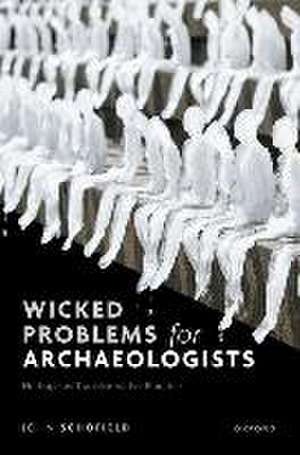Wicked Problems for Archaeologists: Heritage as Transformative Practice
Autor John Schofielden Limba Engleză Hardback – 30 mai 2024
Preț: 219.56 lei
Preț vechi: 262.24 lei
-16% Nou
Puncte Express: 329
Preț estimativ în valută:
42.01€ • 43.98$ • 34.76£
42.01€ • 43.98$ • 34.76£
Carte disponibilă
Livrare economică 04-10 martie
Preluare comenzi: 021 569.72.76
Specificații
ISBN-13: 9780192844880
ISBN-10: 0192844881
Pagini: 368
Ilustrații: c. 35
Dimensiuni: 160 x 240 x 20 mm
Greutate: 0.75 kg
Editura: OUP OXFORD
Colecția OUP Oxford
Locul publicării:Oxford, United Kingdom
ISBN-10: 0192844881
Pagini: 368
Ilustrații: c. 35
Dimensiuni: 160 x 240 x 20 mm
Greutate: 0.75 kg
Editura: OUP OXFORD
Colecția OUP Oxford
Locul publicării:Oxford, United Kingdom
Recenzii
Archaeology isn't the first subject that comes to mind when researching wicked problems. Yet, according to this important and intriguing book, archaeology is exactly where we can look to gain small wins that carry us towards resolution. In presenting this case, John Schofield may just have redefined the true purpose of archaeology.
This book not only offers insightful views on wicked problems but also considers how archaeologists and heritage practitioners might most productively apply their work to concrete solutions. Rather than making exaggerated claims for his disciplines' capacities to solve humanity's existential crises, John Schofield instead advocates a pragmatic long game, accumulating 'small wins' delivered by savvy disciplinary leaders operating as policy entrepreneurs to nudge government and business in the desired direction. Modest, certainly, in the face of such crises, but it is much better to under-promise and over-deliver than the reverse when the future of humankind is at stake!
Wicked Problems is a timely contribution to the scholarship of contemporary archaeology and heritage studies. Covering topics ranging from climate change and pollution to social justice and wellbeing, Schofield shows why archaeological and deep-time perspectives matter in the present and for the future. A book that deserves a broad readership.
Archaeology has the ability to travel through time and to consider contemporary phenomena in relation to the deep history of human existence. According to John Schofield, this gives archaeology nothing less than superpowers in tackling some of today's most pressing questions. In this book he shows how our knowledge of the past actually may help guide the way to a better world.
John Schofield is a wide-ranging and innovative book that encourages readers to think about archaeology in an entirely new way, as fresh, relevant, and future-oriented. It examines some of the novel ways that archaeology (alongside cultural heritage practice) can contribute to resolving some of the world's most wicked problems, or global challenges as they are sometimes known.
This book not only offers insightful views on wicked problems but also considers how archaeologists and heritage practitioners might most productively apply their work to concrete solutions. Rather than making exaggerated claims for his disciplines' capacities to solve humanity's existential crises, John Schofield instead advocates a pragmatic long game, accumulating 'small wins' delivered by savvy disciplinary leaders operating as policy entrepreneurs to nudge government and business in the desired direction. Modest, certainly, in the face of such crises, but it is much better to under-promise and over-deliver than the reverse when the future of humankind is at stake!
Wicked Problems is a timely contribution to the scholarship of contemporary archaeology and heritage studies. Covering topics ranging from climate change and pollution to social justice and wellbeing, Schofield shows why archaeological and deep-time perspectives matter in the present and for the future. A book that deserves a broad readership.
Archaeology has the ability to travel through time and to consider contemporary phenomena in relation to the deep history of human existence. According to John Schofield, this gives archaeology nothing less than superpowers in tackling some of today's most pressing questions. In this book he shows how our knowledge of the past actually may help guide the way to a better world.
John Schofield is a wide-ranging and innovative book that encourages readers to think about archaeology in an entirely new way, as fresh, relevant, and future-oriented. It examines some of the novel ways that archaeology (alongside cultural heritage practice) can contribute to resolving some of the world's most wicked problems, or global challenges as they are sometimes known.
Notă biografică
John Schofield is a Professor in the Archaeology Department at the University of York (UK). Following a PhD at Southampton University, John spent 21 years with English Heritage (now Historic England) before being appointed to the University of York in 2010, going on to serve as Head of Archaeology. John holds adjunct positions at Griffith and Flinders universities (Australia), and is Docent at the University of Turku (Finland). John is a Fellow of the Society of Antiquaries of London, a Corresponding Fellow of the Australian Academy of the Humanities and Member of the Chartered Institute for Archaeologists.
